-
072022. 04
No. 198 View. 176507
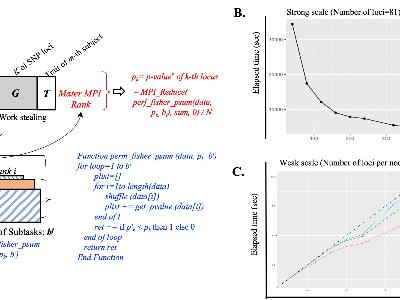
KISTI achieves Parallelization of world-class Genome Wide Association Study(GWAS...
KISTI achieves Parallelization of world-class Genome Wide Association Study(GWAS)- Optimization of Genome Wide Association Study's statistical error correction through parallel computing - A. Summary of the MPI-GWAS algorithm: Simultaneous/parallel analysis through MPI-Rank for quick calculation of N-Permutations B-C. Performance evaluation results: (B) Decrease in overall elapsed time by increasing parallel processing nodes(C) Expandability of elapsed time as simultaneous increasing with parallel processing nodes and data KISTI announced that it has developed a large-scale supercomputing software to correct statistical errors* in Genome Wide Association Study(GWAS). * It refers to a phenomenon in which the statistical significance calculation result through the large-scale GWAS is reported as false-positive. Representative cases of false-positive in the field of GWAS are that genetic mutations with low posibility of a genetic disease are reported to be highly related to the disease. Using the SW developed at Nurion, KISTI's 5th National Supercomputer, genetic mutations related to diabetes and high blood pressure from repoted 84,295 genetic mutations in 7,523 Korean cohorts and 4,242 British cohorts, were derived through GWAS calculations, and corrected those statistical errors by performing up to 7 billion random permutations. The supercomputing simulation SW can accelerate calculations by more than 300% compared to existing statistical programs through using up to 2,500 nodes* of Nurion. * It is capable of performing about 7.5 petaflops (1 petaflops = 1,000 trillion instructions per second) and accounts for about 25% of the performance of Nurion. The results of the GWAS analysis aim to select phenotype variation(disease or fruit weight, etc.), and the discovery of significant disease-related genetic mutaions is considered an important indicator of personalized health care and new varieties improvement in agriculture. Therefore, statistical error correction of GWAS results is essential. The statistical error correction of GWAS remained a challenge in the field because of its vast calculation. KISTI confirmed that it is possible to correct the existing errors by large-scale supercomputing-based petaflops-class calculating through parallel computing technology. Using Nurion, KISTI performed on GWAS with the world-class resources(7.5 petaflops). Dr. Kwon Oh-kyung and Dr. Paik Hyo-jung said, "This GWAS parallelization SW has been released its source code*, so that various genetic researchers can freely use it. We are expecting a research efficiency using supercomputer in the genetic field." Its research was published on March 31st in Genomics & Informatics**. * https://github.com/hypaik/proj_MPIGWAS ** Paik et al, MPI-GWAS: a supercomputing-aid permutation approach for genome-wide association studies Jeong Min-joong, director of Supercomputing Application Center said, "KISTI supports optimal parallelization* technology and computational resources for supercomputer users who need large-scale calculation. We expect that the distributed supercomputing simulation software will provide the research efficiency in the bio and medical fields." * Optimal parallelization is a technology that solves difficult problems by developing code that allows thousands of CPUs to perform simultaneously on supercomputer. -
062022. 04
No. 197 View. 242942
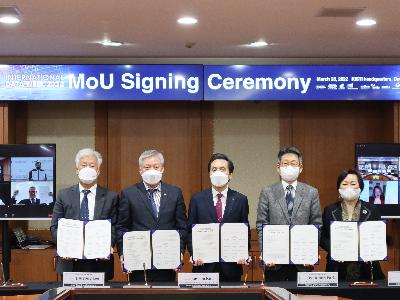
KISTI signed a MoU for a successful hosting of IDW 2022
KISTI signed a MoU for a successful hosting of IDW 2022 - Cooperation to hold the world's largest conference for opening and utilizing research data - KISTI held a MoU signing ceremony at the KISTI Daejeon Headquarters on March 28th, with research data-related international/domestic organizations to successfully host the world's largest conference, International Data Week 2022 (IDW 2022). IDW 2022 is a joint holding event to share research data with CODATA*, RDA**, and WDS***. * Committee on Data(CODATA) which is established by International Science Council(ISC) ** Research Data Alliance(RDA) *** World Data System(WDS) which is an affiliated organization of ISC IDW 2022 was scheduled to be co-hosted in South Korea on Nov. 2021, but it was postponed due to global pandemic situations and will be held in Dragon City, Seoul, South Korea for seven days from June 18th, 2022. In IDW 2022, people will discuss the data innovation ecosystem that promotes social contribution with new scientific discoveries in accordance with the recent data research paradigm, "Open Data and Utilization", also CODATA and WDS will jointly organize the research data conference "SciDataCon 2022" that for about 1,000 research data experts will be participate from 66 countries. The signing ceremony is aimed at promoting cooperation for the successful hosting of IDW 2022, sharing/utilizing research data, and creating and revitalizing an ICT-based national research data ecosystem. From ISC, CODATA executive director Simon Hodson, WDS executive director Meredith Goins, and RDA secretary general Hillary Hanahoe attended online. Also KISTI president Kim Jae-soo, Korea Institute of Geoscience and Mineral Resources(KIGAM) president Lee Pyeong-koo, Korea Institute of Oriental Medicine(KIOM) president Lee Jin-yong, Korea Research Institute of Standards and Science(KRISS) president Park Hyun-min, National Library of Korea's chief executive Suh Hye-ran, and SungKyunKwan University(SKKU) president Shin Dong-ryeol attended offline at KISTI. Kim Jae-soo, president of KISTI said, "IDW 2022 will promote international open research data cooperation to raise awareness of research data sharing and utilization, and from that Korea's research data capabilities will rise to a world-class. We would like to ask for a lot of interest and participation from foreign and domestic research data experts. -
222021. 11
No. 196 View. 283059
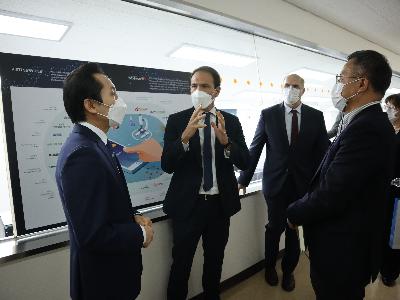
Mr. Cédric O, French Secretary of State for the Digital Transition and Electroni...
Mr. Cedric O, French Secretary of State for the Digital Transition and Electronic Communications visited KISTI - Discussed Cooperation with KISTI in Digital Transition - On Nov. 18th, Mr. Cedric O, Secretary of State for the Digital Transition and Electronic Communications of France has visited Korea Institute of Science and Technology Information(President KIM Jaesoo, hereafter referred to as KISTI) to discuss mutual cooperation of science and technology institutes of both countries in the field of Digital Transition. State Secretary Cedric O has worked as an assistant for digital economy to President Emmanuel Macron since 2017 and took the office of the Secretary of State in charge of digital in 2019. He is currently serving as State Secretary of Digital Transition and Electronic Communications. He has interest in digital transition, electronic information and communication networks, and collaboration with SMEs and showed strong interest in cooperation with Korea in these areas. KISTI is providing national science and technology data platforms such as ScienceON and NTIS, and has the national supercomputer No. 5 Nurion with a performance of 25.7 PetaFlops. As a national science and technology information institution based on such science and technology infrastructure and data, KISTI is contributing to the creation of a national data ecosystem by building a science and technology data dam for the digital new deal as well as domestic and foreign science and technology information. Dr. Kim Jaesoo, President of KISTI while mentioning the cooperation with the French National Institute for Research in Computer Science and Automation (INRIA) and the French Institute of Science and Technology Information (INIST), has emphasized the importance of global cooperation of S&T information organizations of both countries. State Secretary Cedric O also mentioned the need for cooperation and exchange for the sustainable development of the two countries in the digital field based on excellent infrastructure, and proposed to expand coordination at the working level between representative organizations. President Kim Jaesoo said, “The wave of the great digital transition is innovating all structures of our society, and this is spreading all over the world. In this context, we will further strengthen cooperation with French specialized organizations to carry out our mission of being the country's chief scientific and technological data officer (CDO)." -
232021. 09
No. 195 View. 297115
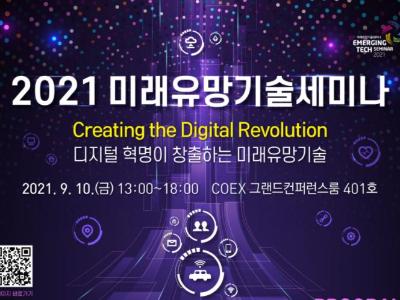
What is the promising technology in the future?
KISTI has hold '2021 Promising Technology Seminar' under the theme of 'The Future Promising Technology Created by the Digital Revolution' at COEX in Seoul on Sep. 10th. In this seminar, promising future technologies derived by analyzing scientific and technological data and successful commercialization cases were presented. Promising technologies for the future include △deep learning △parasitic computing △platform-based community △agile and ragile manufacturing △energy cloud △new carbon material △human-earth symbiosis △on/off mental health △expansion from DNA to RNA △with corona . At the event, △New normal era, how the market responds (CEO Jong-yoon Kim, CEO of Yanolja) △The future of metaverse drawn by SK Telecom (Jeon Jin-soo, SK Telecom Metaverse CO head) △ Subscription Economy that stimulates digital transformation of companies (Jin-hyeok Ahn, Vice President of Kakao) △ Thematic presentations on quantum computing tasks and directions using superconducting qubits (Dr. Hanhee Baek, IBM) were followed. Also, ‘Digital Healthcare Future Strategy’ by Celltrion Exeive Vice President Sooyoung Lee, ‘Strategy and Technology for Carbon Neutrality’ by Inwan Son, Exeive Director of Hanwha Solutions Central Research Institute, ‘Future Technology Discovered in Data’ by Dr. Hyeyoung Yang of KISTI, Dongkyu Won KISTI R&D Investment Strategy Research Center Jang's 'promising fields for government R&D investment' were introduced. Dr. Kim Jae-soo, president of KISTI, said, "Science technology and data analysis help rational and accurate value judgment in the new normal era. " -
162021. 07
No. 194 View. 267341
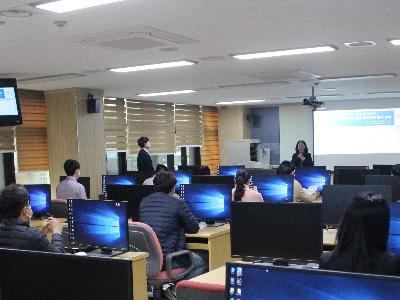
Joint training program with National Fire Agency
KISTI and National Fire Agency have conducted training program for firefighting big data analysis from July 5th to 9th. The two organizations signed an MOU in 2020 for the purpose of utilizing and spreading scientific technology and academic infrastructure and nurturing experts in big data related to NFA. Based on this, KISTI has conducted training program on big data analysis using artificial intelligence (AI) for information staff of NFA. Through this training program, KISTI and NFA hope to nurture experts in big data analysis customized for firefighting by linking KISTI's internal capabilities such as big data analysis, HPC, and AI utilization with NFA’s approximately 17.1 billion big data on firefighting to achieve big data-based national disaster problem solving and safety service innovation. The first training program for 2021 consists of topics such as ▷understanding supercomputer and future technologies, and using in firefighting fields ▷using big data to predict disaster damage in urban areas ▷firefighting big data analysis and visualization. It is planned to be operated with a focus on strengthening the capacity to analyze and utilize big data so that it can be applied in practical applications. KISTI and NFA will open more specialized training program for nurturing big data analysts for the purpose of realizing the digital new deal policy, and conduct joint research in analyzing data owned by NFA using KISTI supercomputing infrastructure to develop disaster prediction model. Dr. Ahn Boo-young, director of KISTI Science Data School, said, “Starting with this program, we will cultivate customized big data analysis experts based on big data owned by public institutions.” and “we will do our best to strengthen public safety through continuous collaboration with public organizations and advancement of data literacy” -
142021. 07
No. 193 View. 279814
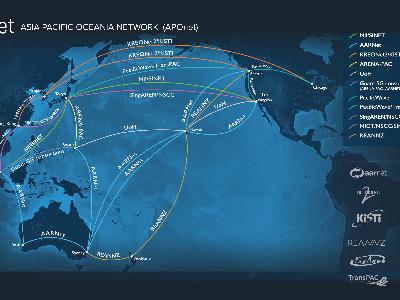
KISTI joined the Asia Pacific Oceania Global Research Network Council(APOnet)
KISTI has signed a multilateral MoU on Jul.17th for the formation of the Asia Pacific Oceania Global Research Network Council (APOnet) in which six countries, including Korea, the United States, Japan, Australia, New Zealand, and Singapore, participate together and commenced operation in earnest. KISTI is building a research data superhighway that transmits massive research data in the field of large science and convergence research at high speed through the National Science and Technology Research Network (KREONET). KREONET has contributed to world-class scientific discoveries such as the discovery of Higgs particles and imaging black hole at the first in the world based on a 100 gigabyte global research network that can transmit large-scale research data. APOnet constructed this time enables high-speed transmission of large-capacity research data in the Oceania region to research institutes in the Asia-Pacific region by interconnecting 100 gigabyte international research networks in the Oceania region as well as in the Asia-Pacific region, and is to maximize the availability of international research network services through mutual backup. It also seeks to develop and support various international applications by promoting cooperation among the research networks of participating countries. In particular, it is expected that global collaborative research based on large-scale research data generated from large-scale research equipment such as SKA, the world's largest radio telescope being built in Australia, and the Korea-type superconducting fusion device (KSTAR), an artificial solar research device in Korea, is expected to accelerate. Dr. Lee Hyuk-ro Lee, Director of the Science and Technology Research Network Center, said, “The high-speed transmission of massive scientific data in the data-intensive large science field called the 4th generation science through APOnet is particularly important for domestic researchers to secure scientific big data generated around the world to conduct global research without limitations.” -
042021. 06
No. 192 View. 315393
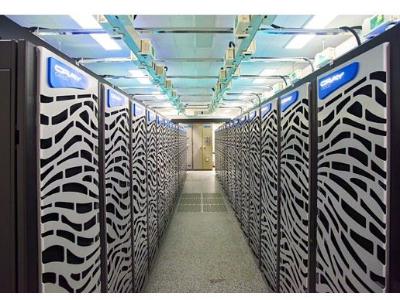
Supercomputer 6, “possibly exempted from preliminary feasibility study”
With the government’s willingness to introduce and develop supercomputers, it has been confirmed that the introduction of Supercomputer 6 is likely to be exempted from a preliminary feasibility study. The Ministry of Science and ICT announced on the 28th that it would achieve world 5th in computing power by 2030 through the national high-performance computing innovation strategy. Following the introduction of Supercomputer 6 in 2023 and 7 in 2028, the plan is to develop exascale (100 quintillion times per second) supercomputer by 30 years. According to KISTI, the capacity of supercomputer 6 will be about 500 Petaflops (a Petaflop is 1000 trillion operations per second). supercomputer 5, Nurion, cost 25.7 Petaflops, with a budget of 45 million US$. Therefore, it is expected that the budget for supercomputer 6 with a capacity of 500 Peta, will far exceed the amount, exempted from the preliminary feasibility study. Currently, as for the domestic supercomputer, KISTI is operating supercomputer 5 'Nurion'. In 2018, when introduced, it was ranked 11th, but now it has been pushed to the top 20th, and the introduction of supercomputer 6 is urgently needed. In particular, there was 8 years gap between supercomputer 4 and 5, the competitiveness of domestic supercomputers is getting weaker. KISTI said "Usually, supercomputers were introduced every five years, but the introduction of supercomputer 5 was delayed. To speed up the introduction of supercomputer 6, the exemption of preliminary feasibility study should be finalized at the end of this year and the budget should be reflected in the 2023 year. And, there will an admin. process such as bid, contract including assembly, so we will be able to assembling around the end of 2023.” The top supercomputer list announced in November last year, is occupied by advanced countries in science and technology such as Japan, the United States, and China. In particular, Japan ranked 1st in the world with its self-developed Fugaku supercomputer (442 Petaflops). It is also noteworthy that Germany entered the 7th and Saudi Arabia ranked 10th. Countries with top supercomputer performance are accelerating development of Exascale computer. The importance of data in artificial intelligence, autonomous vehicles, space, nuclear fusion, and biotechnology, is growing, and it seems that they are rushing to develop their own supercomputer. Korean government has decided to develop develop a 20 Exaflops supercomputer by 30 years with its own technology of CPU, memory and storage. Although there is no development experience so far, experts say that there is a high possibility because Korea has core technologies in semiconductors. KISTI said, "It will be possible if industry-university-research institutes form a consortium to develop it." "In particular, Korea has strengths in core technologies such as memory semiconductors, so we think it will be possible by 2030." -
182021. 05
No. 191 View. 354421

KISTI celebrated its 20th anniversary on May 19th.
KISTI has celebrated its 20th anniversary on May 19th and declared to strengthen its role in supporting the nation, society, and companies through digital innovation that combines data and artificial intelligence in the overall research project. President Kim Jae-soo said, "Through KISTI's leading digital transformation, we will transform from an existing science and technology information organization to the highest authority for national science and technology data." "We will do our best to realize this through an agile strategy that quickly finds the best way and the science and technology infrastructure that we have accumulated over the past 59 years," he said. To this end, we present Agile, Digital Transformation (DX), and ESG as implementation strategy for the core value, “TRUST KISTI, Trust and Innovation” under the vision of 'KISTI changing the world with science and technology infrastructure and data'. In addition, through the DNA (Data, Network, AI) ecosystem built on the basis of KISTI's institutional R&R (Role and Responsibility), KISTI will utilize its own science and technology data, supercomputing, and intelligent information analysis infrastructure to solve national and social issues such as the Digital New Deal. And, KISTI will contribute to solving national and social issues through institutional research projects such as △Activation of the open science ecosystem through digital transformation over the entire cycle of national R&D △Leading the national ultra-high performance computing ecosystem by securing future-ready high performance computing technology △Establishing Intelligent analysis system for promoting national science and technology innovation ecosystem △Digital transformation based on Data and AI. President Kim Jae-soo said, “The management strategy presented this time includes a willingness to turn a crisis of social changes such as △ transition to a non-face-to-face (untact) society △ full-fledged arrival of the data era △ transition to artificial intelligence in all industries, which has become a necessary rather than an option, into an opportunity for challenge. -
042021. 05
No. 190 View. 390646
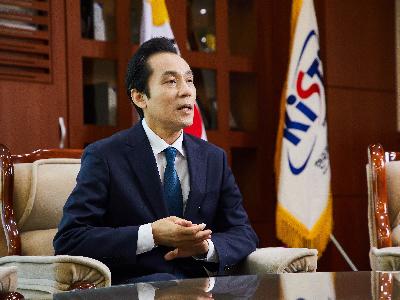
Dr.Kim Jaesoo interview with Money Today "Agile is the answer to Digital Transf...
"In the era of digital transformation, speed is vital. Rather than dragging one big project with elaboration, we need to proceed with an 'Agile' approach that s 10 projects and gets one of them to success." In an interview with Money Today on April 29, Dr.Kim said, "The digital transformation is proceeding faster than expected, and we are going to introduce an agile strategy in all fields such as R&D and administration." The interview was held at the site of the Money Today global conference '2021 Key Platform' held at the Conrad Hotel in Seoul on the subject of 'Dismantling the Group: Internalization of adaptive execution' on the 28th and 30th of last month. KISTI is a specialized research institute that provides science and technology knowledge information for industry-academia-research researchers based on supercomputing and data analysis technology, and supports corporate technology commercialization. Data is the beginning and end of work. Dr.Kim who took office on March 23, emphasizes “proper timing” and “capability"' the most. As it is an institution that deals with data called crude oil in the 4th industrial revolution and digital age, it should not be left behind the trend of the times. Dr.Kim said, "As the public sector emphasizes accuracy and stability, it is inevitable to be cautious when making certain plans, but considering too much time often lead to bad result“. He also said "The digital age is an era of creativity and adventure, so public institutions shouldn't work the old way." “KISTI’s customer service would be somewhat insufficient at first, but we will focus more on providing the necessary data in a timely manner and persuade customers.” “Customer could complain about the service, but now we are not afraid of such a thing,” he emphasized. The change has already begun. Dr.Kim is introducing an agile strategy in all areas of KISTI work, including administration, planning, policy, and research projects. For example, He ed the '3 · 3 · 3 Talk' right after his inauguration. It is a program in which the President and employees communicate face to face on the third and third days of the month at 3:00 pm without a set subject. Dr.Kim said, "In the past, it would have taken several months for the department in charge to plan the program, obtain approval from the top, and modify the program in order to have time to communicate with the staff." "If only the picture comes out, I'll try to run it," he said. Dr.Kim suggested 'Changing the world with Data' as KISTI vision. KISTI will celebrates its 60th anniversary next year. He said, "People who have data in the past, people who know where the data is after that, people who use data well now are the best." and “Data should be focused on its utilization,” he said. He cited the example of the flood prevention project with Incheon Metropolitan City. "In the past, building a levee around the area where there was a lot of flooding was all, but analyzing the meteorological model with big data and artificial intelligence, and opening the structure of the sewage pipe will come up with a new alternative." “I am trying to contribute to creating a happy and joyful world with data-driven solution” he said. KISTI is also actively fostering data companies. Dr.Kim plans to upgrade ASTI, a window for supporting small and medium-sized business technology commercialization, to DX(Digital Transformation) ASTI(Association of Science and Technology Information). KISTI is focused on strengthening the digital capabilities of companies. Dr.Kim said, "KISTI will provide technology consulting services so that companies can accumulate and manage data well and support them to develop their innovative growth capabilities." and “"Our goal is to make data unicorn companies appear among the companies we have supported." -
272021. 04
No. 189 View. 416757
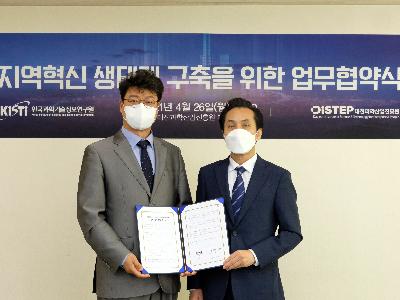
Cooperation with DISTEP for Regional Innovation
KISTI signed a MoU with Daejeon Institute of Science & Technology for Enterprise & People(DISTEP) to build a regional innovation ecosystem on April 26th. This MoU is one of the efforts to play a central role in regional innovation by linking and spreading the tangible and intangible outcomes of GRIs(government research institutes) industries in the Daejeon area. Under this MoU, KISTI leads regional innovation by providing the nation's largest science and technology information and world-class infrastructure, and conducts multilateral exchanges and cooperation in solving regional problems. DISTEP is to play a role as a hub for regional demand and regional innovation. Mutual cooperation will include ▷Research and exchange for sharing and utilization of national R&D information and science and technology knowledge infrastructure ▷Collaboration of research data management system based on the National Research Data Platform (DataON) ▷Supercomputing and data infrastructure joint use to support SMEs ▷Analytical models for technology commercialization such as ups, support for systems, and mutual exchange ▷Joint cooperation on competency diagnosis and market competitiveness analysis for SMEs' innovative growth ▷Human resource cooperation and exchange for mutual cooperation between the two organizations. In particular, as the importance and value of regional innovation increases, the two organizations expect that the Daejeon city will promote various convergence and cooperation with the local science and technology innovation institutions to create food and jobs for future. Kim Jae-soo, President of KISTI, said, “Through cooperation with the DISTEP and KISTI's infrastructure and S&T capabilities, we will contribute to creating a region-led innovation ecosystem” and said “Now, for GRIs, innovation through national R&D is important, but it is more important to utilize its capabilities for regional innovation.”

 Delete Article!
Delete Article!